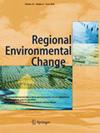西班牙生物文化景观中土地弃置的叙事
IF 3.4
2区 环境科学与生态学
Q2 ENVIRONMENTAL SCIENCES
引用次数: 1
摘要
在地中海地区,农村遗弃是一个重要的过程,对农村和城市地区的可持续性提出了挑战。虽然越来越多的研究集中在土地放弃的生态影响和影响以及再野生化的作用上,但从地方角度对土地放弃的社会文化层面的研究存在知识差距,尽管这对土地管理决策至关重要。本研究的重点是西班牙西部的一个案例研究,在那里使用了一项社会调查来评估当地社区对土地遗弃的看法及其对自然对人类和生活质量的贡献的影响。2020年夏季,在案例研究地区开展了一项调查活动,收集了205份面对面调查。结果表明,当地社区总体上对农村撂荒持消极态度。此外,当地受访者认识到传统农业是维持自然对人类福祉贡献的主要来源。此外,还发现了四组关于农村遗弃的叙述,代表了具有不同动机和农村遗弃解释的受访者群体。本文呼吁更好地理解农村遗弃的观念、价值观和动机,以及如何将其结果用作景观管理的输入。我们的研究结果表明,当地居民认为农村生计的丧失可能会导致严重的环境和社会问题,因为当地人被迫放弃与农村相关的生活方式并迁移到城市地区。本文章由计算机程序翻译,如有差异,请以英文原文为准。
Narratives of land abandonment in a biocultural landscape of Spain
Abstract Rural abandonment is a significant process in the Mediterranean region, posing sustainability challenges for rural and urban areas. Although there is an increase in studies focusing on the ecological implications and impacts of land abandonment and the role of rewilding, there is a knowledge gap in the study of the socio-cultural dimension of abandonment from the local perspective, even though it is crucial for land management decision. This study focuses on a case study in Western Spain, where a social survey was used to assess the perceptions of local communities regarding land abandonment and their implication on nature’s contributions to people and quality of life. A survey campaign was administered in the case study region during the summer of 2020, collecting 205 face-to-face surveys. The results show that local communities overall have a negative reaction toward rural abandonment. In addition, local respondents recognize how traditional agriculture is the main source for maintaining nature’s contributions to human well-being. Additionally, four groups of narratives toward rural abandonment were identified representing clusters of respondents with different motivations and interpretations of rural abandonment. This paper calls for understanding better the perceptions, values, and motivations toward rural abandonment and how their outcomes can be used as input for landscape management. Our results indicate that the local population perceives that the loss of rural livelihoods may entail serious environmental and societal problems, as locals are forced to abandon their rural-associated ways of life and migrate to urban areas.
求助全文
通过发布文献求助,成功后即可免费获取论文全文。
去求助
来源期刊

Regional Environmental Change
环境科学-环境科学
CiteScore
6.80
自引率
2.40%
发文量
125
审稿时长
4.5 months
期刊介绍:
Environmental changes of many kinds are accelerating worldwide, posing significant challenges for humanity. Solutions are needed at the regional level, where physical features of the landscape, biological systems, and human institutions interact.
The goal of Regional Environmental Change is to publish scientific research and opinion papers that improve our understanding of the extent of these changes, their causes, their impacts on people, and the options for society to respond. "Regional" refers to the full range of scales between local and global, including regions defined by natural criteria, such as watersheds and ecosystems, and those defined by human activities, such as urban areas and their hinterlands.
We encourage submissions on interdisciplinary research across the natural sciences, social sciences and humanities, and on more focused studies that contribute towards the solutions to complex environmental problems. Topics addressed include (i) the regional manifestations of global change, especially the vulnerability of regions and sectors; (ii) the adaptation of social-ecological systems to environmental change in the context of sustainable development; and (iii) trans-boundary and cross-jurisdictional issues, legislative and governance frameworks, and the broad range of policy and management issues associated with building, maintaining and restoring robust social-ecological systems at regional scales.
The primary format of contributions are research articles, presenting new evidence from analyses of empirical data or else more theoretical investigations of regional environmental change. In addition to research articles, we also publish editorials, short communications, invited mini-reviews on topics of strong current interest, as well as special features that provide multifaceted discussion of complex topics or particular regions
 求助内容:
求助内容: 应助结果提醒方式:
应助结果提醒方式:


